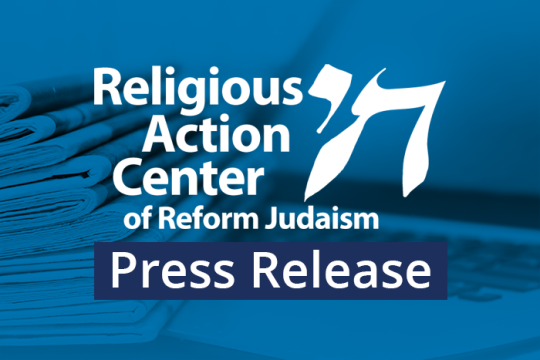Rabbi David Saperstein: "The Court has sent a clear message today that it is blind to the disturbing realities of how we elect political leaders in a post-Citizens United world - one that prioritizes money over policy, passion, and intellect."
WASHINGTON, D.C., June 25, 2012 -- In response to the U.S. Supreme Court's summary reversal of American Trade Partnership v. Bullock, a case that would have revisited the 2010 Citizens United v. Federal Elections Commission decision that opened the door to unlimited corporate and union spending in political campaigns, Rabbi David Saperstein, Director of the Religious Action Center of Reform Judaism, issued the following statement:
We are extremely disappointed in today's U.S. Supreme Court's reversal of American Trade Partnership v. Bullock. In states across the nation today we see that mixing unlimited money and politics is toxic to our democracy and harmful to the welfare of our nation. Citizens United has only amplified these problems in our political system to an unprecedented degree.
For close to a century Montana played an active role in limiting these problems, but now the Court has struck down the state's sensible efforts. We concur with Justice Breyer, who wrote in his dissent that "this court's legal conclusion should not bar the Montana Supreme Court's finding, made on the record before it, that independent expenditures by corporations did in fact lead to corruption or the appearance of corruption in Montana. Given the history and political landscape in Montana, that court concluded that the state had a compelling interest in limiting independent expenditures by corporations."
Most of all, today's ruling is a sorely missed opportunity for the Court to revisit its unwise and unjust 2010 decision. The Court has sent a clear message that it is blind to the disturbing realities of how we elect political leaders in a post-Citizens United world - one that prioritizes money over policy, passion, and intellect. Campaign finance reform is not just an issue of politics, but also an issue of faith. We read in the Torah, "You shall not judge unfairly: you shall know no partiality; you shall not take bribes, for bribes blind the eyes of the discerning and upset the plea of the just" (Deuteronomy 16:19). We must continue to advocate for new opportunities and alternative financing systems that raise up the voices of those too often underrepresented in politics.
We renew our call for a remedy to the Citizens United decision, as well as the affirmation of the right of states to regulate abuses of their campaign finance system, and will keep fighting for responses such as clean-money public financing systems until the next opportunity arises for the Court to revisit this shameful ruling.


